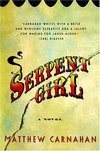LA Times book critic Eugen Weber is channeling Nero Wolfe in his latest Sunday wrap-up of mysteries. For instance, he has this to say about James Swain’s MR LUCKY :
Master of con, flimflam, hornswoggle and simple cheating, James Swain
has turned out another sparkling hymn to gambler-gulling and its rival
sport: detection.
 And he wasn’t too fond of Matthew Carnahan’s SERPENT GIRL.
And he wasn’t too fond of Matthew Carnahan’s SERPENT GIRL.
[The book] is touted
by Publishers Weekly as a gleefully deranged tale. In fact, it’s toxic
waste: the humorless derangement more apparent than glee……Carnahan’s flummery and his frequently fried cast should prove a
knockout among video game fans, especially the 7- to 20-year-olds, at
least those who can read and enjoy his miscellany of rage, alcohol,
drugs, deception, thieving, prurience and pornography.
"Hornswoggle" and "Flummery"? Is this 1940? While it’s nice to see Weber actually venturing an opinion for a change, the real fun is trying to follow some of his tortured sentences. Take this one, for example:
That permits Carnahan, a Southern California filmmaker with a weather
eye on the future flick, to in quick takes sketch a foul world of
scamming and smash-and-grab; tweaked-out people using peyote, speed
meth and nitrous oxide; and, of course, lots of graphic sex and
exuberant brutality.
A "weather eye on the future flick?" Do people still stay "flick?" Groovy.

Of course it’s not 1940 — didn’t you read the review? It’s actually 1946. I mean, it must be. Because otherwise it would mean that this moron chose to review a collection of detective stories written by William Faulkner that was published 59 years ago.
And it’s not like this is some new collection of stories long uncollected, or some new edition with a nifty forward by Robert Parker or some other eminent Faulkner scholar. This is the same Vintage edition that’s been available (albeit in two slightly different sizes, with two different covers) since I first read Faulkner in the late 70s.
What the hell is this doing in a roundup of contemporary mystery fiction — especially when he doesn’t actually seem to have anything particular to say about the book, or broader point to make about it? Maybe he just discovered that Faulkner co-wrote the screenplay for The Big Sleep and wanted to broadcast this previously undiscovered — to anyone unable to read movie credits — knowledge to the world, since the major substance of his review seems to be that Faulkner and Raymond Chandler actually had substantially different writing styles. I can’t wait until next week when we compare The Murder of Roger Ackroyd with Finnegan’s Wake. Yes, Agatha Christie and James Joyce, indeed, they were two completely different writers. What an observation. Where’s my Pulitzer?
Is this the only way to sneak a mystery review in the the Book Review — to throw in a minor work by a Nobel laureate and thus prove to the editors that he really cares abot literature? If so, I guess Weber has the last laugh. He doesn’t like the book much. Apparently, Faulkner uses too many words.
Since when did the LA Times release their book page from the subscriber-only side of their site?